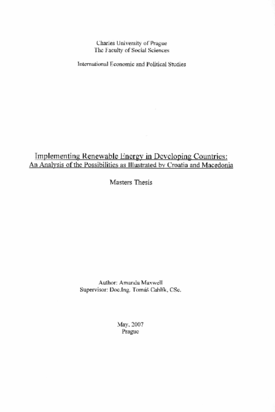Implementing Renewable Energy in Developing Countries: An Analysis of the Possibilities as Illustrated by Croatia and Macedonia
Implementing Renewable Energy in Developing Countries: An Analysis of the Possibilities as Illustrated by Croatia and Macedonia
diplomová práce (OBHÁJENO)

Zobrazit/
Trvalý odkaz
http://hdl.handle.net/20.500.11956/14538Identifikátory
SIS: 56575
Kolekce
- Kvalifikační práce [18431]
Autor
Vedoucí práce
Oponent práce
Sojka, Milan
Fakulta / součást
Fakulta sociálních věd
Obor
Mezinárodní ekonomická a politická studia
Katedra / ústav / klinika
Katedra politologie
Datum obhajoby
8. 2. 2008
Nakladatel
Univerzita Karlova, Fakulta sociálních vědJazyk
Angličtina
Známka
Výborně
The thesis investigates the implementation of renewable energy sources in developing countries. As develeping states are generally not thought to be in the financial or political position to focus their efforts on developing renewable energy technologies, this paper looks at the physical, technological and economic realities of the situation. Using Croatia and the Former Yugoslav Republic of Macedonia as examples, the paper finds that there are some realities present in developing countries which prove to be difficult obstacles. Nonetheless, these hindrances are not insurmountable, and can be controlled by the governments, to the benefit of all. The thesis begins with a look at Croatia and then at Macedonia - a chapter for each one, focusing first on their macroeconomic situations, then on geography, next on present energy sectors, and finally on the international commitments they both belong to which require them to implement more renewable energy sources. The third chapter looks at the five main types of renewable energies available now: hydro, wind, solar, biomass and geothermal power. The fourth chapter examines the other aspects of implementing renewable systems: the financing, the foreign direct investment, R&D sectors, government deployment methods, and technology transfers. The fifth chapter...
